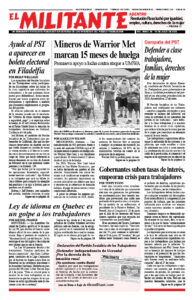More and more prison systems across the country are no longer delivering mail from the post office to workers behind bars. On the pretext of slowing the flow of drugs and other contraband to inmates, they are requiring that letters, cards, drawings or photos from friends and family be sent to a special facility to be scanned, and then make available only a digital copy to the prisoner.
Some prison systems have turned this policy into a moneymaking operation, charging prisoners for printouts or even just for electronic access to the scans.
The Militant first became aware of the policies from subscribers in Florida prisons, who brought it to our attention after being introduced there in February.
“As a family man, it’s real important for me to keep some original letters, photos, cards, and drawings,” Florida prisoner Luis Rosario wrote in March. “If I wish to keep a copy of a letter or photo, I will have to pay for a printout,” he notes. “This is not a security issue, just a reactionary campaign meant to more firmly dominate us.”
The Florida Department of Corrections set the price of a print at 25 cents a page for black-and-white copies and $1 per page for color. For prisoners with little access to funds, this can be an insurmountable obstacle.
For digital copies accessed through a kiosk or tablet, Florida prisoners are allowed to keep a maximum of 200 letters, inmates say. Each time a new one is added, the oldest one is deleted.
Prisoners are no longer allowed to receive stamps and writing paper from friends and relatives. Instead, they have to purchase those supplies at inflated prices from the commissary. Another prisoner wrote that this “limits our access to the outside world.”
Pennsylvania’s Department of Corrections became one of the first prison systems to ban mail and replace it with scans, in 2018. At the end of 2021 the North Carolina Department of Public Safety and the New Mexico Corrections Department both followed suit. Federal prison authorities tested a similar pilot program for at least a year.
Smart Communications, the private firm that scans the letters for Pennsylvania inmates, reports that it is hoping to expand “services” to more of the over 100 state and local prison systems it works with in over 20 states. And, the company boasts, scanning the correspondence “opens a whole new field of intelligence” for prison authorities.
Many prisoners say the digital copies they receive are low quality, especially of photos, or have sections that have been scanned incorrectly or are cut off.
Prisoners at Wisconsin’s Fox Lake Correctional Institution complain of long delays and missing pages after a pilot mail policy began there. But once the mail is scanned, it’s shredded, “with no recourse for us to get the mistakes fixed,” inmate Joshua Wade told the Wisconsin State Journal. “We’re not asking them not to photocopy our mail. We’re just asking for some type of way to get things fixed when they mess up.”
“Eliminating physical mail is needlessly cruel,” some 40 human rights, prisoner rights, unionists, religious groups and others wrote in a letter to U.S. Attorney General Merrick Garland in July 2021. “Letters from family members, drawings from children, and greeting cards from loved ones help maintain family and community connections.”

